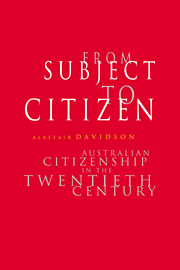Part II - Discourses of Exclusion
Published online by Cambridge University Press: 06 January 2010
Summary
The starting point for discussion in this section is the nature of citizenship in the first four chapters of this book. In those chapters we pointed out that the best theory today states that the primary right of a citizen is the vote of equal value with that of every other citizen. It adds that that vote cannot exist as an autonomous individual contribution to a consensual notion of the public good unless two conditions are met. There must be the right to life, to freedom of movement, to conscience, speech and organisation. There must also be freedom from economic and social deprivation for each individual. Without all of these the vote would be an empty exercise. The best practice today embodies those notions. The postwar Constitutions of all advanced countries and all international instruments establishing universal standards incorporate the view of such theory.
It needs to be stated immediately that both before and after Federation the rights of all Australian citizens have lagged far behind either ‘best international practice’ or any theory of what a citizen should be. It also needs to be stated that citizenship here has, until very recently, been based on nationality requirements which, when unpacked, were racist.
As Britons, the whites who invaded this continent and established their state here after 1788 brought with them the existing legal–formal rules of citizenship of the Anglo-Saxon common law and legislation of the British parliament. The primary rule since 1608 had been that all people born on British soil were subjects of the British sovereign and enjoyed the rights of those subjects (the ius soli).
- Type
- Chapter
- Information
- From Subject to CitizenAustralian Citizenship in the Twentieth Century, pp. 143 - 148Publisher: Cambridge University PressPrint publication year: 1997



